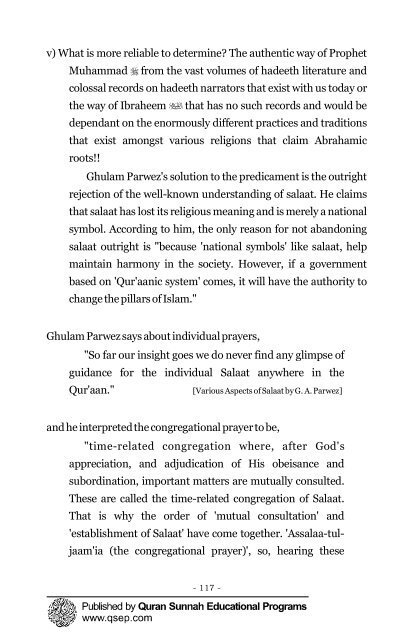A critical analysis of the Modernists and the Hadeeth ... - Islam House
A critical analysis of the Modernists and the Hadeeth ... - Islam House
A critical analysis of the Modernists and the Hadeeth ... - Islam House
You also want an ePaper? Increase the reach of your titles
YUMPU automatically turns print PDFs into web optimized ePapers that Google loves.
v) What is more reliable to determine? The au<strong>the</strong>ntic way <strong>of</strong> Prophet<br />
Muhammad � from <strong>the</strong> vast volumes <strong>of</strong> hadeeth literature <strong>and</strong><br />
colossal records on hadeeth narrators that exist with us today or<br />
<strong>the</strong> way <strong>of</strong> Ibraheem � that has no such records <strong>and</strong> would be<br />
dependant on <strong>the</strong> enormously different practices <strong>and</strong> traditions<br />
that exist amongst various religions that claim Abrahamic<br />
roots!!<br />
Ghulam Parwez's solution to <strong>the</strong> predicament is <strong>the</strong> outright<br />
rejection <strong>of</strong> <strong>the</strong> well-known underst<strong>and</strong>ing <strong>of</strong> salaat. He claims<br />
that salaat has lost its religious meaning <strong>and</strong> is merely a national<br />
symbol. According to him, <strong>the</strong> only reason for not ab<strong>and</strong>oning<br />
salaat outright is "because 'national symbols' like salaat, help<br />
maintain harmony in <strong>the</strong> society. However, if a government<br />
based on 'Qur'aanic system' comes, it will have <strong>the</strong> authority to<br />
change <strong>the</strong> pillars <strong>of</strong> <strong>Islam</strong>."<br />
Ghulam Parwez says about individual prayers,<br />
"So far our insight goes we do never find any glimpse <strong>of</strong><br />
guidance for <strong>the</strong> individual Salaat anywhere in <strong>the</strong><br />
Qur'aan."<br />
[Various Aspects <strong>of</strong> Salaat by G. A. Parwez]<br />
<strong>and</strong> he interpreted <strong>the</strong> congregational prayer to be,<br />
"time-related congregation where, after God's<br />
appreciation, <strong>and</strong> adjudication <strong>of</strong> His obeisance <strong>and</strong><br />
subordination, important matters are mutually consulted.<br />
These are called <strong>the</strong> time-related congregation <strong>of</strong> Salaat.<br />
That is why <strong>the</strong> order <strong>of</strong> 'mutual consultation' <strong>and</strong><br />
'establishment <strong>of</strong> Salaat' have come toge<strong>the</strong>r. 'Assalaa-tul-<br />
jaam'ia (<strong>the</strong> congregational prayer)', so, hearing <strong>the</strong>se<br />
- 117 -

















